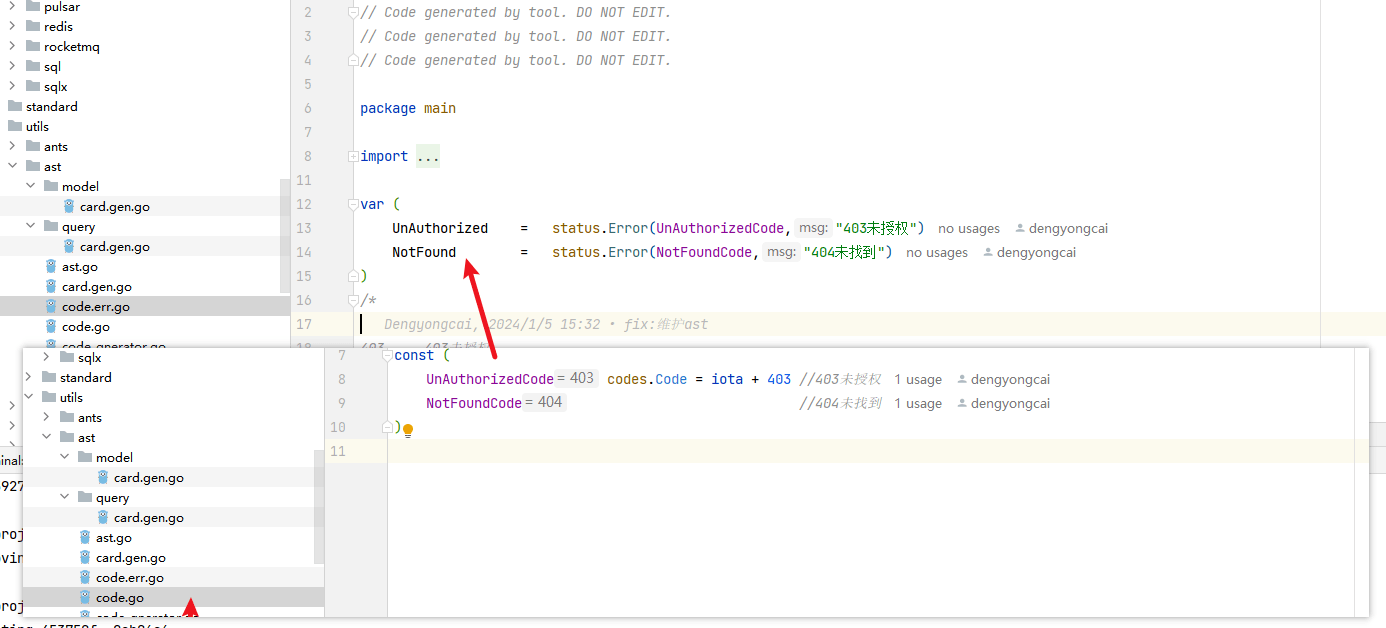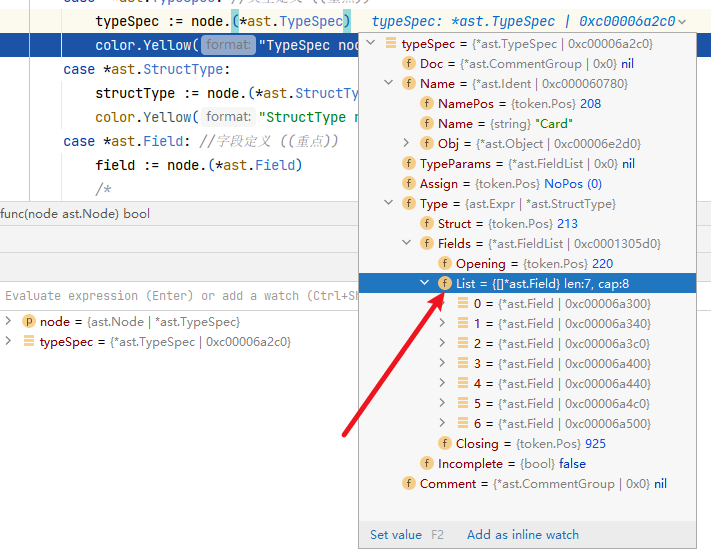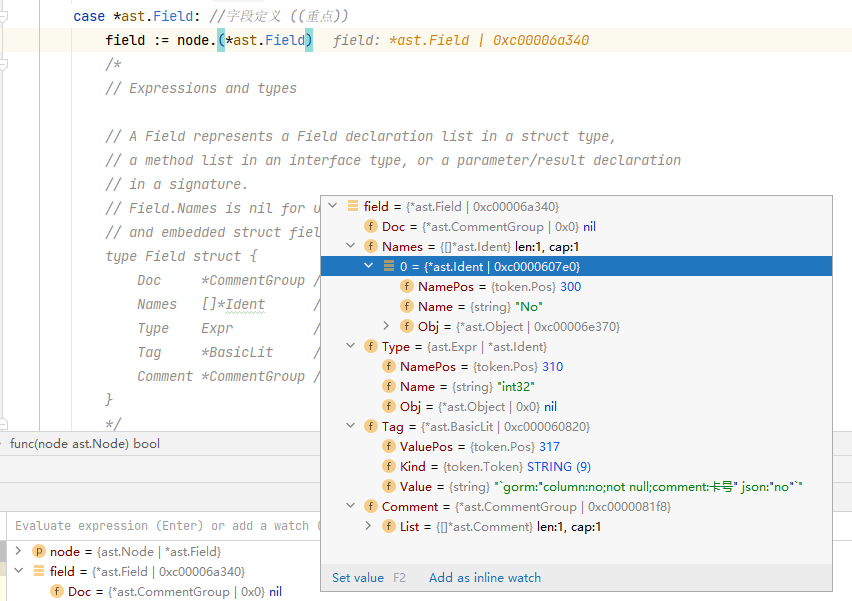AST语法树
refer
https://juejin.cn/post/6844903982683389960#heading-2
本文的代码地址
https://github.com/luxun9527/go-lib/tree/master/utils/ast 您的star就是我更新的动力
核心概念
go文件,可以视为一颗由方法,包,字段,变量,注释组成的语法树,可以使用go提供的api,可以获取go文件中的方法,包,字段,变量,注释等信息,
何时使用
当你有需求要根据一段go代码生成一段新的go代码、文档或有时候使用一些工具(protobuf,gorm gen生成model)生成的代码无法满足我们的需求的时候。
例子1
根据错误码生成对应的错误定定义

例子2
将gen生成的代码,加上我们自己定义的方法。

例子3
给protobuf生成的文件注入我们自己的tag protoc-go-inject-tag
api介绍
在go提供的api中所有的,包,字段,变量,注释等元素视为node,主要是三种,Expressions and type nodes, statement nodes, and declaration nodes.
// There are 3 main classes of nodes: Expressions and type nodes,
// statement nodes, and declaration nodes. The node names usually
// match the corresponding Go spec production names to which they
// correspond. The node fields correspond to the individual parts
// of the respective productions.
//
// All nodes contain position information marking the beginning of
// the corresponding source text segment; it is accessible via the
// Pos accessor method. Nodes may contain additional position info
// for language constructs where comments may be found between parts
// of the construct (typically any larger, parenthesized subpart).
// That position information is needed to properly position comments
// when printing the construct.
// All node types implement the Node interface.
type Node interface {
Pos() token.Pos // position of first character belonging to the node
End() token.Pos // position of first character immediately after the node
}
// All expression nodes implement the Expr interface.
type Expr interface {
Node
exprNode()
}
// All statement nodes implement the Stmt interface.
type Stmt interface {
Node
stmtNode()
}
// All declaration nodes implement the Decl interface.
type Decl interface {
Node
declNode()
}
1 Expression and Type
标识符和类型。
标识符:变量名,函数名,包名,类型名等。
// An Ident node represents an identifier.
Ident struct {
NamePos token.Pos // identifier position
Name string // identifier name
Obj *Object // denoted object; or nil
}
类型:结构体类型,interface类型,方法类型等。
// A type is represented by a tree consisting of one
// or more of the following type-specific expression
// nodes.
type (
// An ArrayType node represents an array or slice type.
ArrayType struct {
Lbrack token.Pos // position of "["
Len Expr // Ellipsis node for [...]T array types, nil for slice types
Elt Expr // element type
}
// A StructType node represents a struct type.
StructType struct {
Struct token.Pos // position of "struct" keyword
Fields *FieldList // list of field declarations
Incomplete bool // true if (source) fields are missing in the Fields list
}
// Pointer types are represented via StarExpr nodes.
// A FuncType node represents a function type.
FuncType struct {
Func token.Pos // position of "func" keyword (token.NoPos if there is no "func")
TypeParams *FieldList // type parameters; or nil
Params *FieldList // (incoming) parameters; non-nil
Results *FieldList // (outgoing) results; or nil
}
// An InterfaceType node represents an interface type.
InterfaceType struct {
Interface token.Pos // position of "interface" keyword
Methods *FieldList // list of embedded interfaces, methods, or types
Incomplete bool // true if (source) methods or types are missing in the Methods list
}
// A MapType node represents a map type.
MapType struct {
Map token.Pos // position of "map" keyword
Key Expr
Value Expr
}
// A ChanType node represents a channel type.
ChanType struct {
Begin token.Pos // position of "chan" keyword or "<-" (whichever comes first)
Arrow token.Pos // position of "<-" (token.NoPos if there is no "<-")
Dir ChanDir // channel direction
Value Expr // value type
}
)
2 Statement
赋值语句,控制语句(if,else,for,select...)等均属于statement node。
// A statement is represented by a tree consisting of one
// or more of the following concrete statement nodes.
type (
// A BadStmt node is a placeholder for statements containing
// syntax errors for which no correct statement nodes can be
// created.
//
BadStmt struct {
From, To token.Pos // position range of bad statement
}
// A DeclStmt node represents a declaration in a statement list.
DeclStmt struct {
Decl Decl // *GenDecl with CONST, TYPE, or VAR token
}
// An EmptyStmt node represents an empty statement.
// The "position" of the empty statement is the position
// of the immediately following (explicit or implicit) semicolon.
//
EmptyStmt struct {
Semicolon token.Pos // position of following ";"
Implicit bool // if set, ";" was omitted in the source
}
// A LabeledStmt node represents a labeled statement.
LabeledStmt struct {
Label *Ident
Colon token.Pos // position of ":"
Stmt Stmt
}
// An ExprStmt node represents a (stand-alone) expression
// in a statement list.
//
ExprStmt struct {
X Expr // expression
}
// A SendStmt node represents a send statement.
SendStmt struct {
Chan Expr
Arrow token.Pos // position of "<-"
Value Expr
}
// An IncDecStmt node represents an increment or decrement statement.
IncDecStmt struct {
X Expr
TokPos token.Pos // position of Tok
Tok token.Token // INC or DEC
}
// An AssignStmt node represents an assignment or
// a short variable declaration.
//
AssignStmt struct {
Lhs []Expr
TokPos token.Pos // position of Tok
Tok token.Token // assignment token, DEFINE
Rhs []Expr
}
// A GoStmt node represents a go statement.
GoStmt struct {
Go token.Pos // position of "go" keyword
Call *CallExpr
}
// A DeferStmt node represents a defer statement.
DeferStmt struct {
Defer token.Pos // position of "defer" keyword
Call *CallExpr
}
// A ReturnStmt node represents a return statement.
ReturnStmt struct {
Return token.Pos // position of "return" keyword
Results []Expr // result expressions; or nil
}
// A BranchStmt node represents a break, continue, goto,
// or fallthrough statement.
//
BranchStmt struct {
TokPos token.Pos // position of Tok
Tok token.Token // keyword token (BREAK, CONTINUE, GOTO, FALLTHROUGH)
Label *Ident // label name; or nil
}
// A BlockStmt node represents a braced statement list.
BlockStmt struct {
Lbrace token.Pos // position of "{"
List []Stmt
Rbrace token.Pos // position of "}", if any (may be absent due to syntax error)
}
// An IfStmt node represents an if statement.
IfStmt struct {
If token.Pos // position of "if" keyword
Init Stmt // initialization statement; or nil
Cond Expr // condition
Body *BlockStmt
Else Stmt // else branch; or nil
}
// A CaseClause represents a case of an expression or type switch statement.
CaseClause struct {
Case token.Pos // position of "case" or "default" keyword
List []Expr // list of expressions or types; nil means default case
Colon token.Pos // position of ":"
Body []Stmt // statement list; or nil
}
// A SwitchStmt node represents an expression switch statement.
SwitchStmt struct {
Switch token.Pos // position of "switch" keyword
Init Stmt // initialization statement; or nil
Tag Expr // tag expression; or nil
Body *BlockStmt // CaseClauses only
}
// A TypeSwitchStmt node represents a type switch statement.
TypeSwitchStmt struct {
Switch token.Pos // position of "switch" keyword
Init Stmt // initialization statement; or nil
Assign Stmt // x := y.(type) or y.(type)
Body *BlockStmt // CaseClauses only
}
// A CommClause node represents a case of a select statement.
CommClause struct {
Case token.Pos // position of "case" or "default" keyword
Comm Stmt // send or receive statement; nil means default case
Colon token.Pos // position of ":"
Body []Stmt // statement list; or nil
}
// A SelectStmt node represents a select statement.
SelectStmt struct {
Select token.Pos // position of "select" keyword
Body *BlockStmt // CommClauses only
}
// A ForStmt represents a for statement.
ForStmt struct {
For token.Pos // position of "for" keyword
Init Stmt // initialization statement; or nil
Cond Expr // condition; or nil
Post Stmt // post iteration statement; or nil
Body *BlockStmt
}
// A RangeStmt represents a for statement with a range clause.
RangeStmt struct {
For token.Pos // position of "for" keyword
Key, Value Expr // Key, Value may be nil
TokPos token.Pos // position of Tok; invalid if Key == nil
Tok token.Token // ILLEGAL if Key == nil, ASSIGN, DEFINE
Range token.Pos // position of "range" keyword
X Expr // value to range over
Body *BlockStmt
}
)
3 Spec Node
Spec节点表示单个(非括号括起的)导入、常量、类型或变量声明。
Spec node只有3种,分别是ImportSpec,ValueSpec和TypeSpec:
ImportSpec表示一个单独的import,ValueSpec一个常量或变量的声明,TypeSpec 则表示一个type声明。
/ ----------------------------------------------------------------------------
// Declarations
// A Spec node represents a single (non-parenthesized) import,
// constant, type, or variable declaration.
type (
// The Spec type stands for any of *ImportSpec, *ValueSpec, and *TypeSpec.
Spec interface {
Node
specNode()
}
// An ImportSpec node represents a single package import.
ImportSpec struct {
Doc *CommentGroup // associated documentation; or nil
Name *Ident // local package name (including "."); or nil
Path *BasicLit // import path
Comment *CommentGroup // line comments; or nil
EndPos token.Pos // end of spec (overrides Path.Pos if nonzero)
}
// A ValueSpec node represents a constant or variable declaration
// (ConstSpec or VarSpec production).
//
ValueSpec struct {
Doc *CommentGroup // associated documentation; or nil
Names []*Ident // value names (len(Names) > 0)
Type Expr // value type; or nil
Values []Expr // initial values; or nil
Comment *CommentGroup // line comments; or nil
}
// A TypeSpec node represents a type declaration (TypeSpec production).
TypeSpec struct {
Doc *CommentGroup // associated documentation; or nil
Name *Ident // type name
TypeParams *FieldList // type parameters; or nil
Assign token.Pos // position of '=', if any
Type Expr // *Ident, *ParenExpr, *SelectorExpr, *StarExpr, or any of the *XxxTypes
Comment *CommentGroup // line comments; or nil
}
)
4 others
// Comment 注释节点,代表单行的 //-格式 或 /*-格式的注释.
type Comment struct {
...
}
...
// CommentGroup 注释块节点,包含多个连续的Comment
type CommentGroup struct {
...
}
// Field 字段节点, 可以代表结构体定义中的字段,接口定义中的方法列表,函数前面中的入参和返回值字段
type Field struct {
...
}
...
// FieldList 包含多个Field
type FieldList struct {
...
}
// File 表示一个文件节点
type File struct {
...
}
// Package 表示一个包节点
type Package struct {
...
}
基本用法
类型定义
我们常用的node,一般是有一些比较基础的类型组成的这go中,ast.File,ast.ValueSpec: , ast.TypeSpec ,ast.Field 类型都是由一些基础类型组成,比如TypeSpec 类型下 会doc(CommentGroup) 和filed(FieldList) 字段。ValueSpec 类型下有 ident,doc类型的字段, 具体使用还是要debug 去看 分析这个node下有什么字段。
// A TypeSpec node represents a type declaration (TypeSpec production).
TypeSpec struct {
Doc *CommentGroup // associated documentation; or nil
Name *Ident // type name
TypeParams *FieldList // type parameters; or nil
Assign token.Pos // position of '=', if any
Type Expr // *Ident, *ParenExpr, *SelectorExpr, *StarExpr, or any of the *XxxTypes
Comment *CommentGroup // line comments; or nil
}
ValueSpec struct {
Doc *CommentGroup // associated documentation; or nil
Names []*Ident // value names (len(Names) > 0)
Type Expr // value type; or nil
Values []Expr // initial values; or nil
Comment *CommentGroup // line comments; or nil
}


遍历语法树
package main
import (
"github.com/fatih/color"
"github.com/pkg/errors"
"go/ast"
"go/parser"
"go/token"
"path/filepath"
)
// 遍历节点
func main() {
fileFullPath, err := filepath.Abs("utils\\ast\\card.gen.go")
if err!=nil{
panic(errors.WithMessage(err,"获取文件路径失败"))
}
fset := token.NewFileSet()
f, err := parser.ParseFile(fset, fileFullPath, nil, parser.ParseComments)
if err != nil {
panic(err)
}
ast.Inspect(f, func(n ast.Node) bool {
switch node := n.(type) {
case *ast.GenDecl:
color.Red("GenDecl node %+v",node)
case *ast.TypeSpec: //类型定义 ((重点)) 当我们要解析一个结构体用到
color.Yellow("TypeSpec node %+v",node)
case *ast.StructType:
color.Yellow("StructType node %+v", node)
case *ast.Field:
/*
// Expressions and types
// A Field represents a Field declaration list in a struct type,
// a method list in an interface type, or a parameter/result declaration
// in a signature.
// Field.Names is nil for unnamed parameters (parameter lists which only contain types)
// and embedded struct fields. In the latter case, the field name is the type name.
type Field struct {
Doc *CommentGroup // associated documentation; or nil
Names []*Ident // field/method/(type) parameter names; or nil
Type Expr // field/method/parameter type; or nil
Tag *BasicLit // field tag; or nil
Comment *CommentGroup // line comments; or nil
}
*/
color.Blue("Field node %+v",node)
case *ast.Ident://标识符,包括类型和字段名,变量名,结构体名等
color.Green("ident node %+v",node)
case *ast.SwitchStmt:
color.Magenta("SwitchStmt node %+v",node)
case *ast.Comment:
color.Black("Comment node %+v",node)
case *ast.CommentGroup:
color.Magenta("commentGroup node %+v",node)
case *ast.InterfaceType:
color.Magenta("interfaceType node %+v",node)
case *ast.ValueSpec: //((重点))当我们要解析全局变量,常量的时候用到
color.Magenta("ValueSpec node %+v",node)
}
return true
})
}
修改语法树
给gorm gen 生成的代码增加一些我们自己的方法。直接在ast.FIle node下增加即可
ast.Inspect(f, func(n ast.Node) bool {
switch node := n.(type) {
case *ast.File:
for _, v := range s.Fields {
eqFunc := &ast.SelectorExpr{
X: &ast.SelectorExpr{
X: callerIdent,
Sel: ast.NewIdent(v.FieldName),
},
Sel: eqIdent,
}
funcName := fmt.Sprintf("Find%sBy%s", firstUpper(s.Name), v.FieldName)
funcNameCtx := fmt.Sprintf("Find%sBy%sCtx", firstUpper(s.Name), v.FieldName)
paramIdent = ast.NewIdent(v.FieldName)
paramIdent.Obj = &ast.Object{
Kind: ast.Var,
Name: v.FieldName,
Decl: &ast.Field{
Doc: nil,
Names: []*ast.Ident{ast.NewIdent(v.FieldName)},
Type: ast.NewIdent(_typeMap[v.FieldType]),
Tag: nil,
Comment: nil,
},
Data: nil,
Type: nil,
}
//新增func节点
newSpec := &ast.FuncDecl{
Doc: nil,
Recv: recv,
Name: ast.NewIdent(funcName),
Type: &ast.FuncType{
Func: 0,
TypeParams: nil,
//参数
Params: &ast.FieldList{
Opening: 0,
List: []*ast.Field{{
Doc: nil,
Names: []*ast.Ident{paramIdent},
Type: ast.NewIdent(_typeMap[v.FieldType]),
Tag: nil,
Comment: nil,
}},
Closing: 0,
},
Results: &ast.FieldList{
Opening: 0,
List: []*ast.Field{
{
Doc: nil,
Names: []*ast.Ident{ast.NewIdent("result")},
Type: ast.NewIdent("*model." + firstUpper(s.Name)),
Tag: nil,
Comment: nil,
}, {
Doc: nil,
Names: []*ast.Ident{ast.NewIdent("err")},
Type: ast.NewIdent("error"),
Tag: nil,
Comment: nil,
}},
Closing: 0,
},
},
Body: &ast.BlockStmt{
Lbrace: 0,
List: []ast.Stmt{
&ast.ReturnStmt{
Return: 0,
Results: []ast.Expr{&ast.CallExpr{
Fun: &ast.SelectorExpr{
X: &ast.CallExpr{
Fun: whereFunc,
Lparen: 0,
Args: []ast.Expr{&ast.CallExpr{
Fun: eqFunc,
Lparen: 0,
Args: []ast.Expr{paramIdent},
Ellipsis: 0,
Rparen: 0,
}},
Ellipsis: 0,
Rparen: 0,
},
Sel: takeIdent,
},
Lparen: 0,
Args: nil,
Ellipsis: 0,
Rparen: 0,
}},
},
},
Rbrace: 0,
},
}
}
node.Decls = append(node.Decls, newSpec, newSpecCtx)
}
return false
}
return true
})
func (c cardDo) Scan(result interface{}) (err error) {
return c.DO.Scan(result)
}
func (c cardDo) Delete(models ...*model.Card) (result gen.ResultInfo, err error) {
return c.DO.Delete(models)
}
func (c *cardDo) withDO(do gen.Dao) *cardDo {
c.DO = *do.(*gen.DO)
return c
}
//新增的方法
func (c card) FindCardById(id int32) (*model.Card, error) {
return c.cardDo.Where(c.ID.Eq(id)).Take()
}
有疑问加站长微信联系(非本文作者))







